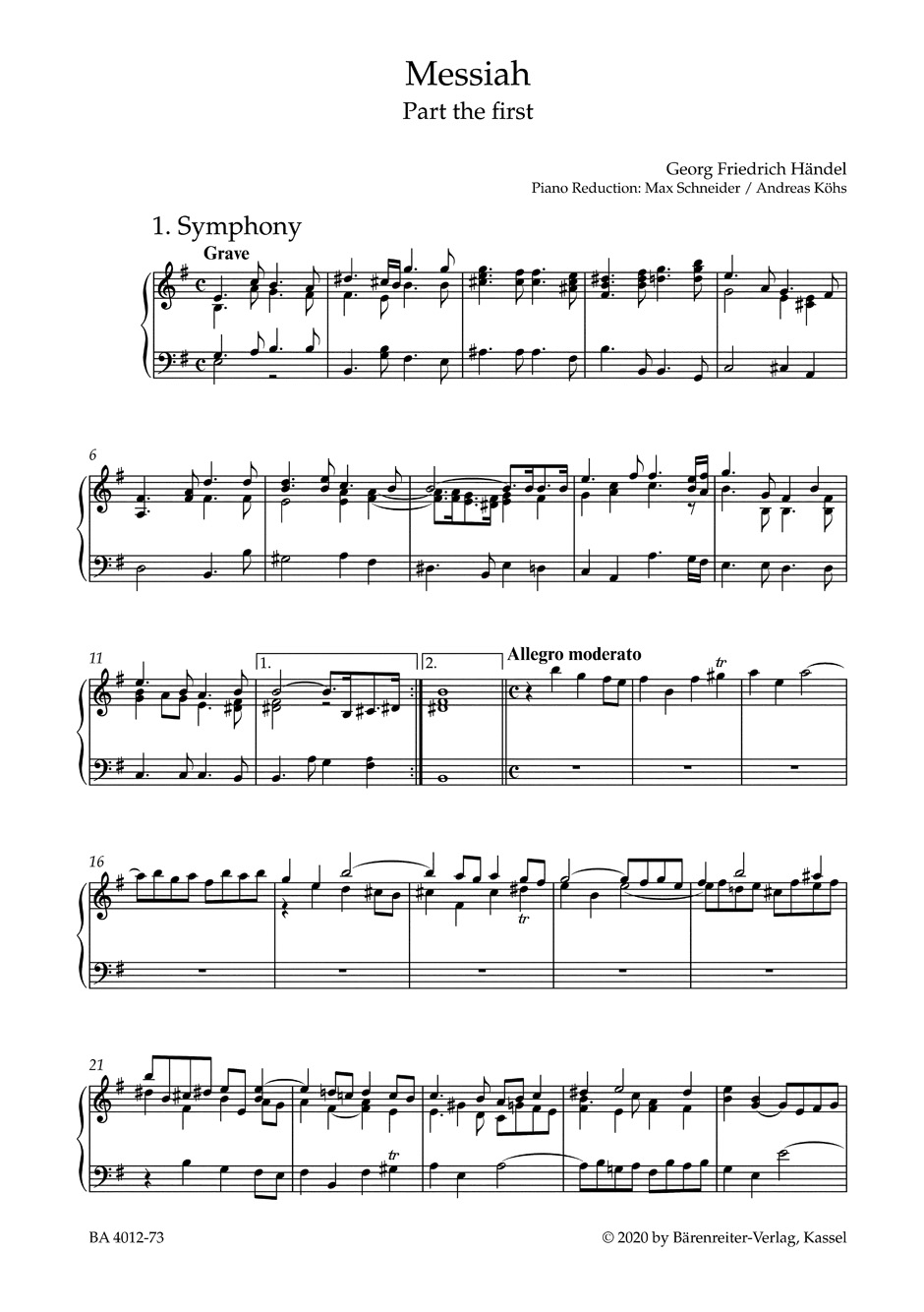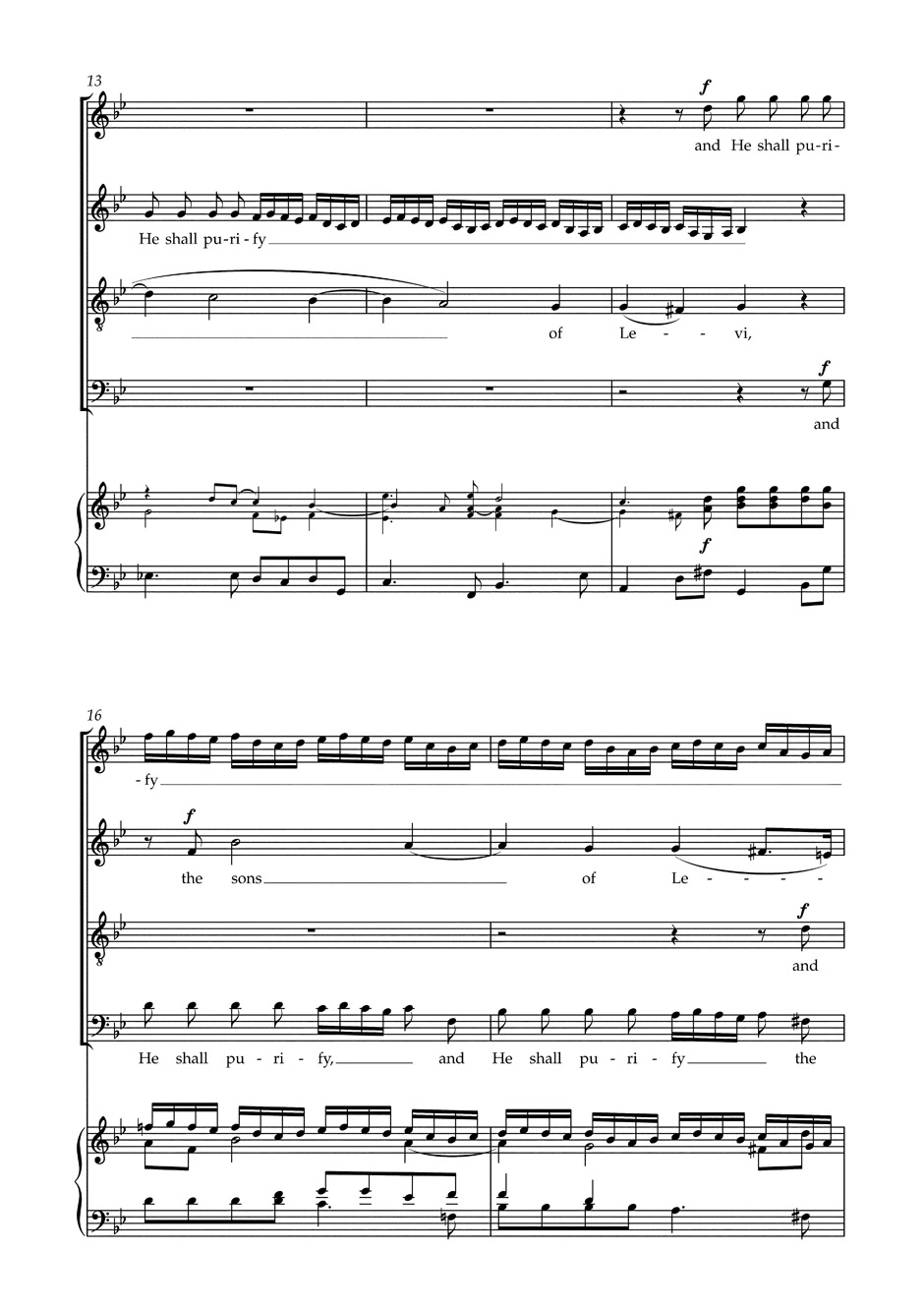
Happy Present Meet
Handel Messiah HWV 56 for Vocal Score (English only)
헨델 메시아 (영문)
Oratorio in three parts
“Messiah“ occupies a unique position in Handel’s work. Its strongly universal character and directness of expression, which appeal to men of all creeds, make it the most renowned work in the whole of the composer’s monumental output.
Passion, cantata, opera, instrumental music – that is, all the important musical genres of the time – these formed the basis of Handel’s new art-form, which developed with ever increasing impetus from the end of 1738 onwards and found a particularly complex realization in “Messiah“.
It is often been said that Handel composed “Messiah” for his visit in Ireland, wither he had been onvited by the Lord Lieutenant, William Cavendish, Duke of Devonshire, to perform his music for the benefit of charity. The first performance took place on 13 April 1742 in Neale’s Music Hall, Dublin. After Handel’s return from Ireland “Messiah” received fifty-six performances in England during his lifetime.
What makes the revised vocal score so special?
- The vocal score has been newly engraved with a generous layout.
- The pagination has been adopted from the previous edition. This means that you can rehearse and perform this work with some singers using this new edition and some the old Bärenreiter edition.
- This new vocal score includes a revised piano reduction: The old Schneider piano reduction has been maintained, but corrected and uncluttered; on the whole the new piano reduction is easier to read and to play.
- The vocal score is fully compatible with all existing performance material (BA04012).
- The text appears in a slightly larger type size.
- Apart from corrections the musical text remains unchanged.
Duration (approx.): 03:00:00
Contents
· Part the first
· 1. Symphony
· 2. Accompagnato - Comfort ye, comfort ye my people (Tenore)
· 3. Air - Ev’ry valley shall be exalted (Tenore)
· 4. Chorus - And the glory, the glory of the Lord
· 5. Accompagnato - Thus saith the Lord, the Lord of Hosts (Basso)
· 6. Air - But who may abide the day of His coming (Alto)
· 7. Chorus - And He shall purify
· Recitative - Behold, a virgin shall conceive (Alto)
· 8. Air and Chorus - O thou that tellest good tidings to Zion (Alto)
· 9. Accompagnato - For behold, darkness shall cover the earth (Basso)
· 10. Air - The people that walked in darkness (Basso)
· 11. Chorus - For unto us a Child is born
· 12. Pifa
· Recitative - There were shepherds abiding in the field (Soprano)
· 13. Accompagnato - And lo, the angel of the Lord came upon them (Soprano)
· Recitative - And the angel said unto them (Soprano)
· 14. Accompagnato - And suddenly there was with the angel (Soprano)
· 15. Chorus - Glory to God in the highest
· 16. Air - Rejoice greatly, O daughter of Zion (Soprano)
· Recitative - Then shall the eyes of the blind open’d (Alto)
· 17. Duet - He shall feed His Flock like a shepherd (Alto, Soprano)
· 18. Chorus - His yoke is easy, His burthen is light
· Part the second
· 19. Chorus - Behold the Lamb of God
· 20. Air - He was despised (Alto)
· 21. Chorus - Surely, He hath borne our griefs and carried our sorrows
· 22. Chorus - And with His stripes we are healed
· 44. Duet - O death, where is thy sting? (Alto, Tenore)
· 45. Chorus - But thanks be to God
· 46. Air - If God be for us, who can be against us (Soprano)
· 47. Chorus - Worthy is the Lamb that was slain
· Appendix
· 6a. Air - But who may abide the day of His coming? (Basso)
· Recitative - But who may abide the day of His coming? (Basso)
· 13a. Arioso - But lo, the angel of the Lord came upon them (Soprano)
· 16a. Air - Rejoice greatly, O daughter of Zion (Soprano)
· Recitative - Then shall the eyes of the blind be open’d (Soprano)
· 17a. Air - He shall feed His flock like a shepherd (Soprano)
· 32a. Air - Thou art gone up on high (Basso)
· 32b. Air - Thou art gone up on high (So-//prano)
· 34b. Air - Air How beautiful are the feet of them (Alto)
· Recitative - Thou shalt break them with a rod of iron (Tenore)
편곡자 Kohs, Andreas
Schneider.M
작곡가 Handel, George Frideric (1685-1759)
에디터 Tobin, John


Handel The Messiah Oratorio (Miniature Score)
Faure Messe de Requiem Op.48 (Vocal Score)
Bach Christmas Oratorio BWV 248 (Vocal Score) (G/E)
Bach Christmas Oratorio BWV 248 (Vocal Score) (G/E)
Debussy Songs 1880-1904 for Voice and Piano
Liszt 25 Songs Vol.2 for High Voice (Ger.) and Piano